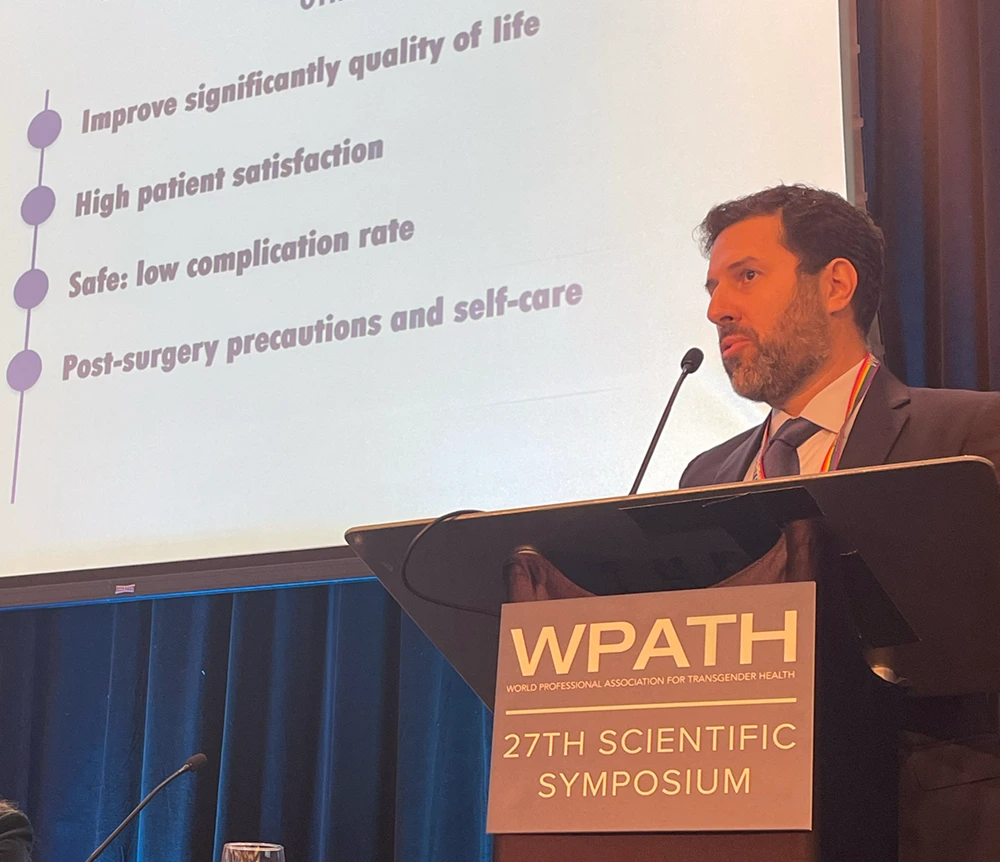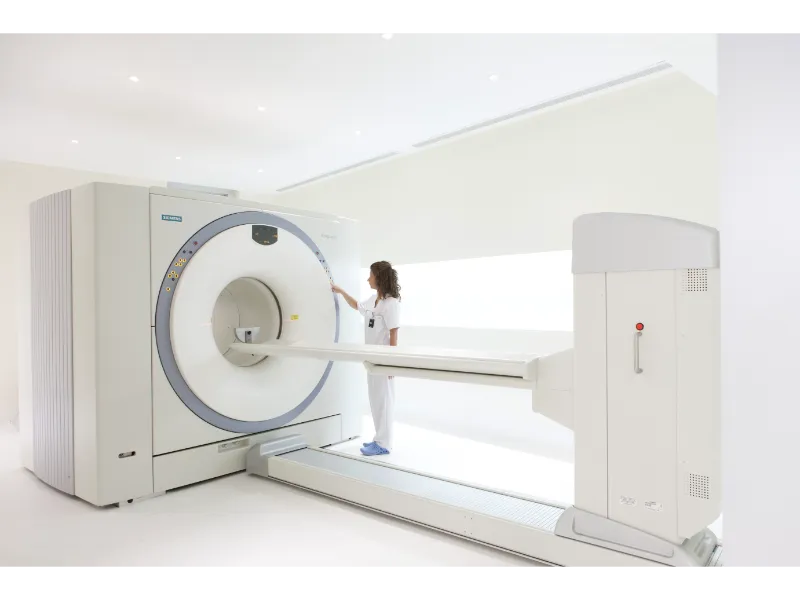WPATH SOC8, a Manifesto for Trans Healthcare

After 5 years of intense work, the updated manifesto of trans health marks a milestone in the human rights for trans, gender diverse and gender nonconforming communities.
This definitive best practices guide of the World Professional Association for Transgender Health (WPATH) is referred to as the “SOC8”, and was released to coincide with the biannual WPATH Symposium in September 2022.
Yet it is much more than just a set of recommendations for healthcare professionals, as it comes out in a politically-charged international scene where trans rights are disputed and revoked in even some of the most progressive countries.
“We hope the SOC8 will be a landmark in better access to inclusive trans health, for the well-being of trans people everywhere,” says Dr. Luis Capitán, who represented Facialteam on the WPATH SOC8 work group of the surgical chapter. “In this latest version, a key highlight is that facial gender-affirming surgery will finally be categorized as a medical necessity, among many other services.”
Dr. Capitán points out that , “We are at a pivotal moment in trans health. The 2022 best practices guide by WPATH has declared the consensus of the scientific community on what is medically necessary gender affirming care. From here onwards, professionals and insurers will now refer to a solid and universal statement supporting access to essential medical attention for trans, nonbinary and all gender diverse people on the planet.”
What is WPATH SOC8?
WPATH SOC 8 is short for the World Professional Association for Transgender Health’s “Standards of Care, 8th version.”
WPATH’s Standards of Care are recommendations for healthcare professionals serving trans, nonbinary and gender diverse people. Although primarily a source of the status quo on all aspects of trans health, WPATH’s SOC informs us about certain rights and responsibilities in the diagnostic and treatment process. For this reason, the 8th SOC in 40 years is the go-to reference for anyone entering the medical community, particularly if with a LGBTQIA+ focus.
The SOC’s equivalent in the universal healthcare scene is created by none other than the largest international authority on best practices in medicine, the World Health Organization (WHO). The WHO publishes the International Classification of Diseases (ICD), whose 11th and most recent update included important changes for the trans community. The ICD is influential as it represents the voice of leaders in healthcare and therefore sets the tone for policy makers and medical insurers everywhere.
The new SOC8 has been published in the International Journal of Transgender Health (IJTH): WPATH’s Standards of Care. With contributions by hundreds of professionals and based on peer-reviewed and verified data from almost 100 pages of references, the SOC8 is a game-changer for advocates of equality in health services.
What is New in WPATH 2022?
WPATH SOC8 consists of 18 chapters, 6 of which are entirely new and many of which have greatly expanded:
- Terminology Chapter
- Global Applicability
- Population Estimates
- Education
- Assessment of Adults
- Adolescents
- Children
- Nonbinary
- Eunuchs
- Intersex
- Institutional Environments
- Hormone Therapy
- Surgery and Postoperative Care
- Voice and Communication
- Primary Care
- Reproductive Health
- Sexual Health
- Mental Health
Dr. Daniel Simon puts the new SOC8 and the WPATH Symposium into perspective. “This September 2022, we are witnesses to a watershed moment in trans healthcare. A week in which hundreds of leading healthcare professionals around the world have congregated in the name of Transgender Medicine. A day in which a new, updated best practices guide, SOC8, declares numerous Gender Affirming interventions are medically necessary, including facial feminization.“
To draw one statement from the SOC8 that sends a clear message to providers: “We recommend all members of the health care workforce receive cultural-knowledge training focused on treating transgender and gender diverse individuals with dignity during orientation and as part of annual or continuing education.”
The Importance of Transgender Standards of Care?
Best practices not only help move forward the quality of care and access, they are as essential as the healthcare they refer to.
Gender diverse people historically report a lack of trans friendly healthcare. However, this is beginning to change. In the latest version of the International Classification of Diseases, WHO shows solidarity with LGBTIQ+ people:
- changes in antiquated language to more affirming and inclusive terms;
- removal from the “disorder” status to the more neutral “gender incongruence” which reduces the stigma;
- modification as a “mental health” condition to a sexual health matter, which depathologizes the approaches and encourages early access.
In general, best practices guides are living documents updated periodically based on the consensus of the corresponding medical community. Standards of Care are a unified statement on health care policy made precisely by the experts they affect.
How was the WPATH Standards of Care Version 8 Developed?
As with much scientific literature of its type, it is a complex process that involves the coordination of various committees, some by vote even, and continual peer review. As is customary, a strict methodology of reviews, feedback and edits is established by the workgroups assigned to each chapter.
In 2017, WPATH started with the complex process of updating the 8th version of the WPATH Standards of Care. This began with establishing the Guideline Steering Committee and chapter members.
Together they then defined the chapters which would be included in the new edition, based on past versions. An evidence review team was created, responsible for the systematic review of all data and sources according to scientific reporting standards.
Finally, an independent professional editor was commissioned.
In a July 2022 message by WPATH’s outgoing president, Walter Bouman, he explained the review process, indicating hopes to have the final document published in advance of the Symposium in September.
WPATH SOC8 Aims to Improve Quality-of-life
WPATH version 8 clarifies details that are necessary for insurance providers of transgender people who seek a medical transition. Healthcare that is categorized as essential to your daily function is much more likely to be covered by medical insurance policies.
Any procedure deemed to be cosmetic, however, is almost never permitted by public or private health coverage.
Endorsements of WPATH’s SOC8 have already been presented by other international organizations.
“The World Association for Sexual Health (WAS) endorses the Standards of Care version 8 of the World Professional Association for Transgender Health. WAS encourages all clinicians, law and policymakers, and civil society members from all over the world to refer to the WPATH SOC 8 and to endeavor to implement it to the best of their ability in their local environment with the best interest of each individual person in mind.”
Effects of FFS on Quality-of-life
In 2020, Facialteam conducted research to survey the effects of FFS surgery on quality-of-life. This survey, among other things, highlights the historic lack of research in trans surgery, as facial gender surgery has largely been considered cosmetic to date.
Our Research and Development team presented evidence on why gender-affirming surgery should be defined as medically necessary in the new SOC8. All existing literature on facial feminization was also reviewed in order to consolidate conclusions.
Researchers measured the physical and psychological health of almost 250 trans women. Part of the test group had FGCS or FFS as part of their transition, and some did not.
This study found that trans women who had undergone facial gender confirmation surgery had significantly higher scores in psychological well-being.
Gender-affirming healthcare is vital for many women in transition or anyone dealing with gender dysphoria. Facialteam advocates to enable greater access for women seeking trans-friendly healthcare.
Facialteam promotes WPATH’s Best Practices
Many of Facialteam’s professionals are active WPATH members, participating in modernizing the field of transgender healthcare through actions such as the SOC8 update.
Other ways that Facialteam contributes to the advancement of gender affirming facial surgery;
- Technological innovations in imaging, surgery and patient care that improve any stage of the FFS process.
- Mental health around the FFS experience is core to our practice, for both patients and their supportive companions.
- Scientific investigation on several themes related to best practices in trans surgery. Such as the medical article, “Facial Gender Confirmation Surgery – Review of the Literature and Recommendations for Version 8 of the WPATH Standards of Care”. The publication appeared in the International Journal of Transgender Health in 2017, an important step towards the necessary changes that were put into effect in the new SOC8.
- Facialteam offers formal Training & Education for future specialists in facial gender surgery. This results in more professionals, more access and more excellent quality of care and results.
Best practices in healthcare are essential to pioneer all areas of care. Minority groups such as trans, nonbinary and other gender queer people are set to benefit most from the modernization of these standards.
Facialteam takes a stand to improve standards in transgender health care as one way to address the greater problems of discrimination, medical malpractice and social exclusion.
Facialteam on SOC8
“Living this moment, as active participants in such an important milestone for providers and changing the rules in benefit of patients, is spectacular and says so much about the proactive company culture of Facialteam.”
“Making a necessity a reality, a huge step forward for our patients.”
“Historial moment and huge contribution to the community.”
“So proud to form part of a pioneering medical group that invests so much in changing the lives of trans people in many ways.”
“Marvelous, how necessary it was for this to be considered necessary! Congratulations as the many small grains of sand are becoming mountains!”





